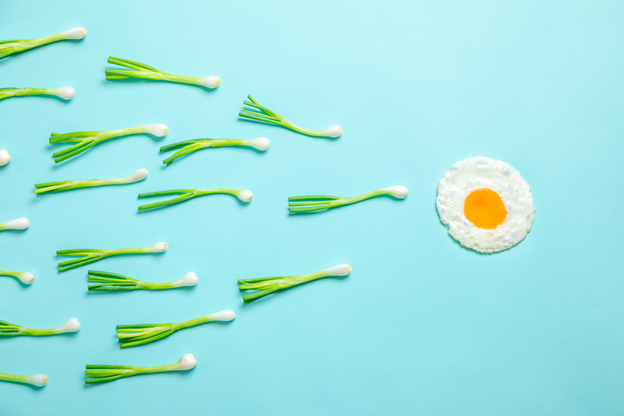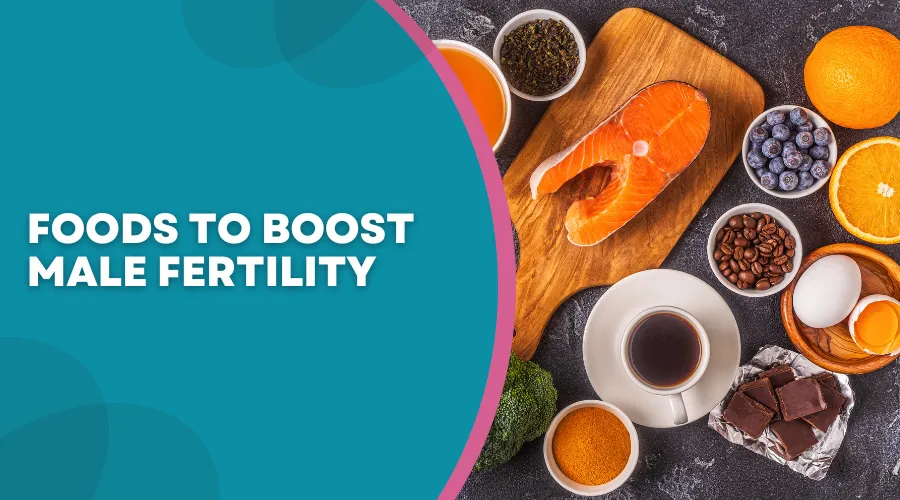Male fertility is often overlooked in the fertility equation, yet it plays an equally critical role in conception. At Nisha IVF Centre in Ahmedabad, we believe in holistic care because treating infertility isn’t just about advanced procedures like IVF or ICSI; it’s also about empowering couples with everyday changes, including diet.
Dr. Nisarg Patel, leading fertility specialist at Nisha IVF, explains:
“Nutrition is one of the most modifiable factors influencing sperm health. The right foods don’t just support sperm count—they improve motility, morphology, and overall reproductive function.”
Infertility affects 1 in 6 couples worldwide, and male factors contribute to 40-50% of cases (WHO, 2023). With such staggering numbers, dietary changes can be a powerful and accessible strategy to improve outcomes.

Why Male Fertility Needs Food Support
While genetic, hormonal, and environmental factors influence male fertility, oxidative stress is a major culprit. Poor diet, smoking, and pollution increase free radicals in the body, which damage sperm DNA, reduce motility, and impact sperm morphology.
A fertility-supportive diet acts as a natural antioxidant shield, helping the body repair and protect sperm cells. And unlike medications, food offers broad-spectrum benefits—balancing hormones, enhancing energy levels, and even improving sexual function.
Key Nutrients for Sperm Health — Not Just Zinc & Vitamin E
Here are the core nutrients linked to better sperm health and male fertility:
- Zinc: Boosts testosterone and sperm count.
- Vitamin E: Powerful antioxidant that protects sperm from oxidative damage.
- Folate: Essential for healthy sperm DNA and count.
- Selenium: Improves sperm motility.
- Vitamin C: Protects sperm DNA and increases concentration.
- Omega-3 Fatty Acids: Enhances sperm morphology and motility.
- Coenzyme Q10: Increases energy production in sperm cells.
- L-Carnitine: Aids in energy metabolism for sperm movement.
These nutrients are best consumed through food rather than isolated pills—your body absorbs and utilizes them better in whole-food form.
10 Best Foods to Boost Male Fertility (With Why & How Much)

Let’s break down the top foods that naturally improve male fertility and answer the big question: What to eat to improve sperm quality?
- Pumpkin Seeds
- Rich in zinc & omega-3s.
- Helps increase sperm count and motility.
- How much: 1–2 tbsp daily.
- Walnuts
- Packed with omega-3s and antioxidants.
- Improves morphology and sperm vitality.
- How much: A handful (7–10) per day.
- Spinach
- High in folate, iron, and magnesium.
- Essential for sperm DNA and formation.
- How much: 1 cup cooked or raw daily.
- Tomatoes
- Rich in lycopene, a powerful antioxidant.
- Improves sperm morphology.
- How much: ½ cup cooked (better absorbed) 3–4 times a week.
- Citrus Fruits (Oranges, Lemons)
- Loaded with Vitamin C.
- Enhances sperm motility and count.
- How much: 1–2 servings daily.
- Eggs
- Contains selenium, vitamin E, and B12.
- Improves sperm motility and strength.
- How much: 1–2 eggs per day.
- Ash Gourd (Winter Melon)
- Traditional Ayurvedic remedy.
- Cooling and detoxifying; supports reproductive health.
- How much: ½ cup juice or vegetable regularly.
- Garlic
- Contains selenium and allicin.
- Enhances sperm motility and blood flow.
- How much: 1–2 cloves per day.
- Dark Chocolate
- Rich in L-arginine and antioxidants.
- May improve sperm volume and quality.
- How much: 1 small square (70%+ cocoa) a few times a week.
- Pomegranate
- High in antioxidants and flavonoids.
- Reduces oxidative stress; boosts testosterone.
- How much: 1 cup of seeds or juice per day.
Want a food-first solution for fertility? Explore our personalized male fertility diet plans at Nisha IVF—blending tradition, science, and sustainability.
Superfoods or Snake Oil? Foods You Can Skip
Some “fertility superfoods” don’t hold up to science. Here’s what to avoid or limit:
- Soy-rich foods: May lower testosterone if consumed excessively.
- Processed meats: Linked to poor sperm morphology.
- Canned foods (with BPA): BPA interferes with hormones and sperm DNA.
- Energy drinks or excessive caffeine: Can lower sperm concentration.
- Alcohol: Impacts testosterone and sperm production.
Remember, moderation is key. Occasional consumption won’t sabotage your efforts, but daily reliance might.
How to Eat These Foods in Real Life — A 1-Day Sample Plan
Sample Male Fertility Diet Plan (Vegetarian-Friendly):
- Morning:
- Warm lemon water
- Scrambled eggs with spinach
- 1 slice whole grain toast
- Handful of walnuts
- Warm lemon water
- Lunch:
- Brown rice with ash gourd curry
- Tomato and cucumber salad
- Buttermilk
- Brown rice with ash gourd curry
- Evening Snack:
- Pomegranate seeds + Pumpkin seeds
- Herbal tea
- Pomegranate seeds + Pumpkin seeds
- Dinner:
- Moong dal soup
- Multigrain roti
- Garlic sautéed spinach
- Small square of dark chocolate
- Moong dal soup
- Before Bed:
- Warm milk with a pinch of turmeric
- Warm milk with a pinch of turmeric
This plan includes vegetarian foods for sperm count support and is easy to follow without exotic ingredients.
Cultural Insights: Desi Foods That Help
Indian and Desi diets offer powerful natural remedies for low sperm count:
- Amla (Indian Gooseberry): Boosts immunity and sperm quality.
- Ghee: Rich in fat-soluble vitamins; improves hormone balance.
- Methi (Fenugreek Seeds): Shown to improve testosterone.
- Dates: Natural aphrodisiac; rich in iron and zinc.
- Ajwain (Carom Seeds): Detoxifies reproductive system.
Incorporating these into your daily meals can subtly enhance fertility without the need for Western superfoods.
Can Supplements Help? When & How to Use Them
Supplements can support—but not replace—a good diet. Use them if:
- Your diet lacks diversity (e.g., vegan, low-calorie).
- You have diagnosed deficiencies (e.g., Vitamin D, Zinc).
- Your fertility specialist recommends specific nutrients.
Recommended male fertility boosting supplements include:
- Zinc Gluconate
- Vitamin C (1000 mg/day)
- Coenzyme Q10 (100–200 mg/day)
- L-Carnitine (2 g/day)
Always consult a fertility expert before starting any regimen.
Real Talk: Food Alone Isn’t Enough
While diet plays a vital role, fertility is multi-dimensional. At Nisha IVF, we take a full-spectrum approach:
- Semen analysis & hormonal tests
- Lifestyle coaching (stress, sleep, alcohol reduction)
- Advanced treatments like IUI, ICSI, and cryopreservation
- Supportive care for both partners
“Nutrition is a powerful tool—but it works best alongside medical guidance. We see the best outcomes when lifestyle changes go hand-in-hand with tailored treatment,” adds Dr. Nisarg Patel.
FAQs About Foods for Male Fertility
Does diet affect sperm count?
Yes. Diet rich in antioxidants, zinc, folate, and omega-3s supports higher sperm count and motility.
What are natural remedies for low sperm count?
Eating antioxidant-rich foods, reducing stress, avoiding toxins, and including Desi remedies like ghee and amla can help.
Which male fertility boosting drinks work best?
Pomegranate juice, amla juice, and smoothies with spinach, banana, and walnuts are beneficial.
Are there vegetarian foods for sperm count improvement?
Yes. Pumpkin seeds, spinach, walnuts, legumes, and amla are excellent vegetarian choices.
When should I start a male fertility diet plan?
Start at least 3 months before planning conception, as sperm regeneration takes ~72 days.
Final Takeaway: Eat Smart, Boost Naturally
A thoughtful, consistent diet can be your ally in improving male fertility. With the right combination of nutrients, Desi foods, and expert guidance, you can lay the groundwork for natural conception or support IVF success.
Remember, food won’t fix everything—but it can give your fertility a strong foundation to build from.
References:
- Cleveland Clinic – Sperm Health and Diet
- Harvard Health – Nutrition and Male Fertility
Disclaimer: The information shared in this content is for educational purposes only and not for promotional use.


